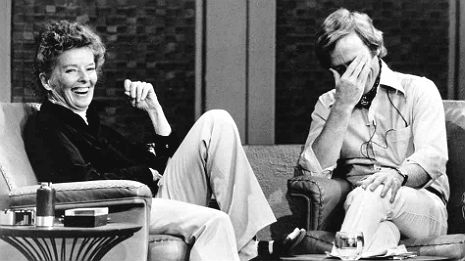
For most of her career, Katharine Hepburn refused to give television interviews. For years Dick Cavett tried to get her on his show, to no avail. Then suddenly, one day in 1973, Hepburn happened to be in the building where his studio was, and decided to check out the set.
Apparently the fiesty 66-year-old actress was feeling chatty that afternoon, because she decided right then and there that she would give Cavett his interview. The host was summoned and without any prep time—or his audience—engaged with Hepburn in the most captivating chat you could ever hope to witness. They spoke for three hours, which was edited down to two shows.
Before things began, Hepburn demanded the set furniture be rearranged, something she was apparently notorious for doing. (“I’ve been in the business so long, I don’t want any complaints from the unions!” she is heard to say).
I was lucky enough to have gotten to see Katherine Hepburn on Broadway in West Side Waltz in 1981. Here’s a particularly good anecdote about her from Playbill’s Judy Samelson:
Let me take you back to 1969. Katharine Hepburn is starring as Chanel in her first and only musical, Coco. Act One ends just as the great designer is about to present her comeback collection to the public. The curtain comes down with a flurry of anticipation. When it rises again for Act Two, the stage is a tumult of overturned chairs, and various accessories on the floor—in short, it looks like a war zone in the aftermath of the show. But the audience is still in the dark. How did it go? Was it a success? Hepburn as Coco rises from where she has been sitting watching the show and walks through the room, surveying the mess. When she reaches the front of the stage, she stops and with great feeling says: SHIT!
As I sat in the darkness of the mezzanine at the Mark Hellinger Theatre, eyes glued to the commanding figure onstage, my ears perked up at the sound of a voice that certainly sounded like hers emanating from below. I thought to myself, “Did she just say what I think she said?” For a moment, time seemed to stop and after an endless split second of silence, my answer arrived in the form of an explosion of laughter, like an enormous tidal wave, starting at the front of the house and crashing past me way up to the balcony.
In his book Tracy and Hepburn, Garson Kanin wrote that he asked Coco’s lyricist and book writer Alan Jay Lerner how he got Hepburn to agree to say the word. Lerner replied: “Easy. She wrote it.”
Kanin then questioned his friend Kate about it and she explained her reasoning. In previous versions of the scene, she said, there had been a lot of expository material explaining that Coco’s fashion how had been a failure. And in a true demonstration of the theory of less is more, Hepburn thought that one very well-placed cuss word would say it all. As she told Kanin, “I needed to start Act Two with a bang.” Mission accomplished.
A few months ago, when it was announced that Miss Hepburn’s theatrical papers had been donated to the Library for the Performing Arts at Lincoln Center, one of the interesting letters that was quoted in the press coverage concerned this one little four-letter word. Apparently, when Coco was headed to Los Angeles, Hepburn was contractually forbidden to use the profanity. Believing that the loss would ruin the integrity of the scene, she fought for it via a letter to Edwin Lester of the Los Angeles Civic Light Opera Association, in which she wrote:
First, we have tried everything that anyone can think of to use instead. Nothing works—the sadness—the finality—the clarity and the brevity of this expression coming from the lips of a highly respectable old lady—who is alone—and who is in tears over the total failure of her show—strikes the audience as funny then as she runs up the stairway—curiously gallant.
Who could not be charmed after receiving such a thoughtful plea from the star? Certainly not Lester. He responded that her letter “was sufficient for us to acquiesce, particularly if acquiescence would make you happy.” And he added, “let me tell you how much we are looking forward to your visit with us, even though you bring that naughty word along with you.”
In this snippet from the Cavett interview, Hepburn discusses her attitude on death, the afterlife and religion.
More Katherine Hepburn and Dick Cavett after the jump…





